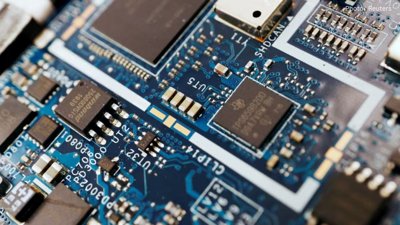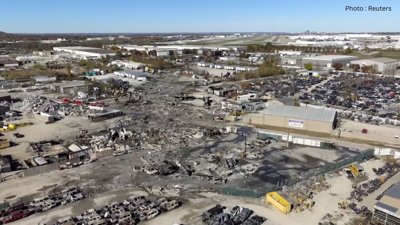
Post by : Amit
Construcciones y Auxiliar de Ferrocarriles (CAF) has officially begun deploying AI-powered door diagnostics systems across multiple Spanish commuter train fleets. This move, announced by CAF earlier this week, marks a significant advance in the company’s ongoing push to embed predictive analytics and intelligent maintenance systems into its rolling stock.
The new solution, already operational on several Renfe-operated Cercanías (commuter) lines, uses artificial intelligence to continuously monitor and assess door health, movement patterns, and component degradation in real time. The goal is to prevent door-related malfunctions before they occur—an issue that has historically accounted for a large portion of delays and passenger dissatisfaction in urban transit.
As Spain’s rail infrastructure continues to modernize under the European Union’s Green and Digital transitions, CAF’s AI door diagnostics system could soon become a model for predictive maintenance adoption in commuter networks across the continent.
Train doors may seem like a minor part of rolling stock, but their functionality is critical to ensuring on-time performance, safety, and boarding efficiency. Malfunctions in door opening or closing systems can result in entire units being taken out of service, especially during peak hours. According to 2023 data from Renfe, door-related faults were responsible for nearly 28% of all technical stoppages in its Cercanías fleet.
CAF’s new diagnostics module directly addresses this pain point. Using AI and machine learning models trained on millions of data points—including historical maintenance logs, temperature shifts, humidity levels, usage frequency, and opening-closing cycles—the system is capable of predicting specific failure modes with over 90% accuracy.
Instead of reacting to door faults when they occur, the system alerts maintenance teams days or even weeks in advance, allowing for scheduled part replacements or recalibrations. For operators like Renfe, this means fewer unexpected downtimes, better allocation of repair resources, and improved service reliability for daily commuters.
The AI door diagnostics suite developed by CAF includes a multi-sensor hardware unit installed on each train door, paired with an edge computing module that runs lightweight AI models locally. These systems collect granular data on door speed, closing force, vibration, motor torque, and electrical current in real time, and use that information to identify subtle anomalies that humans might miss.
For example, if a door is closing even slightly slower than expected due to wear on the guide rails or resistance in the pneumatic system, the AI will flag the trend and generate a predictive service alert. The system then transmits this alert to CAF’s centralized maintenance platform via a secure 5G or LTE network.
But what makes CAF’s implementation particularly innovative is the use of federated learning—a method that enables the AI models to continue learning from patterns across trains in different regions, without compromising passenger or operational data privacy. This ensures that the more the system is used, the smarter and more accurate it becomes.
Before the full-scale deployment, CAF ran trials of the AI diagnostics system on commuter lines in Madrid, Seville, and Bilbao, using a mix of older and newer EMU (Electric Multiple Unit) configurations. These trials were conducted in partnership with Renfe’s engineering division and lasted over nine months.
The results were compelling. Door failure incidents on test units dropped by 42%, and average time spent diagnosing issues was reduced from over 3 hours to under 30 minutes. Maintenance crews were able to intervene proactively, avoiding costly service disruptions.
CAF also reported a marked reduction in emergency halts due to door system errors, especially during cold and rainy weather when door mechanisms are more prone to malfunction. Feedback from drivers and technicians was overwhelmingly positive, with many describing the system as “a long-overdue tool” for improving both safety and operability.
Spain’s commuter rail networks have been under immense pressure post-pandemic, as urban populations return to public transit and sustainability goals push governments to double down on rail investments. The Cercanías networks, in particular, have seen over 6% year-on-year growth in ridership across Madrid, Catalonia, and Andalusia.
Door-related delays are among the top contributors to schedule disruptions, particularly during morning and evening peaks. By implementing predictive door diagnostics at fleet level, CAF and Renfe aim to protect time-sensitive operations and rebuild commuter trust in the reliability of rail transport.
The timing aligns with the Spanish Ministry of Transport’s €2.7 billion modernization package for suburban rail under the Recovery and Resilience Facility (RRF). According to ministry officials, projects like CAF’s AI-driven door diagnostics are exactly the kind of “hidden innovation” that can transform system efficiency without waiting for new trainsets or infrastructure.
While CAF’s initial rollout is focused on Spain, the company has confirmed that it is in talks with transit authorities in Italy, the UK, and Brazil for similar deployments. In Latin America, where mechanical wear and harsh climates pose serious maintenance challenges, predictive diagnostics could help improve fleet availability without increasing maintenance headcount.
CAF’s door diagnostics platform has been built to be train-agnostic, meaning it can be retrofitted on various vehicle types—from trams and light rail to high-capacity suburban trains. This flexibility opens the door for CAF to integrate its technology across its international contracts in cities like Birmingham, Mexico City, and Rome, where door-related failures have also been a persistent issue.
Moreover, the system integrates smoothly with existing train control and monitoring systems (TCMS), and can be used in tandem with Condition-Based Maintenance (CBM) programs already running in parts of Europe.
Rail analysts see CAF’s move as part of a growing trend where rolling stock manufacturers are becoming full-service digital ecosystem providers. Rather than selling just the trains, companies like CAF are investing in the lifecycle performance of their vehicles, offering tools that give operators long-term savings and data-driven control.
“Doors are a high-wear, mission-critical component. If we can monitor them like we monitor engines or brakes, we can finally achieve true operational resilience,” said Dr. Carlos Beltrán, a transport systems professor at the Polytechnic University of Valencia.
He added that AI-based diagnostics could soon become a baseline expectation in train procurement contracts, especially for urban rail where reliability is paramount.
CAF’s door diagnostics initiative is just the beginning. Company officials hint that similar AI modules for HVAC systems, braking assemblies, and pantograph monitoring are in the works. The company envisions a future where every moving part in a train is self-aware, continuously monitored, and capable of requesting maintenance before failure.
By rolling out AI-driven door diagnostics at scale, CAF is helping shift the paradigm in train maintenance—from reactive to predictive, from human-dependent to intelligence-assisted workflows. In doing so, it is not only improving uptime but also setting a powerful example for other manufacturers navigating the intersection of mechanical systems and digital intelligence.
CAF Launches, AI Door, Spanish ,Rail Travel










Advances in Aerospace Technology and Commercial Aviation Recovery
Insights into breakthrough aerospace technologies and commercial aviation’s recovery amid 2025 chall

Defense Modernization and Strategic Spending Trends
Explore key trends in global defense modernization and strategic military spending shaping 2025 secu

Tens of Thousands Protest in Serbia on Anniversary of Deadly Roof Collapse
Tens of thousands in Novi Sad mark a year since a deadly station roof collapse that killed 16, prote

Canada PM Carney Apologizes to Trump Over Controversial Reagan Anti-Tariff Ad
Canadian PM Mark Carney apologized to President Trump over an Ontario anti-tariff ad quoting Reagan,

The ad that stirred a hornets nest, and made Canadian PM Carney say sorry to Trump
Canadian PM Mark Carney apologizes to US President Trump after a tariff-related ad causes diplomatic

Bengaluru-Mumbai Superfast Train Approved After 30-Year Wait
Railways approves new superfast train connecting Bengaluru and Mumbai, ending a 30-year demand, easi